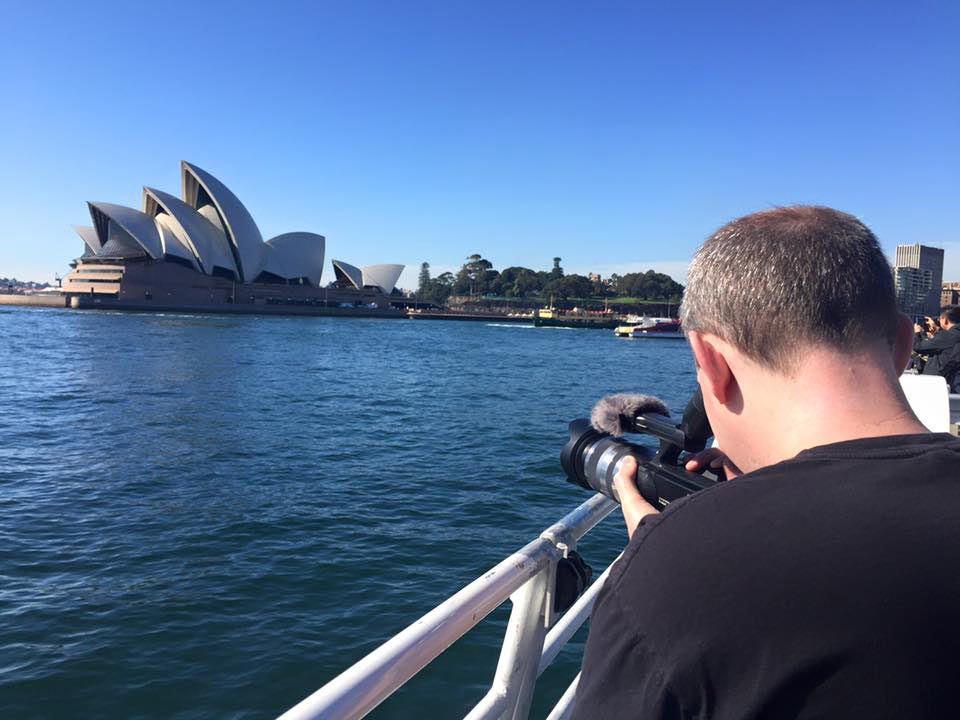
We set up the Online Learning Academy as we firmly believe in the work-life-balance concept and we hope that others will be able to take what they learn from our courses to benefit their own lives. We believe it’s important to follow your dreams, wherever they may take you, and that you shouldn’t be restricted from pursuing what you love because of fear.
Our courses teach you how to work for yourself, find freelance work and manage your time to become your own boss. We don’t just produce and run these courses; we live what we preach and hope you can too. With that in mind, here are some tips we have formulated on a recent tour of Australia on traveling while working.

1 – Don’t check your emails throughout the day
When you’re sat in an office with your computer in front of you it’s almost impossible to switch off from checking emails as soon as they arrive. If you’re working remotely, it’s still difficult to remove yourself from the urge to check emails every hour, or more often, when you have a highly powerful computer in your pocket called a smartphone.
When you’re travelling, however, you should make an effort to cut yourself off from emails for a few hours each day. Whether or not you have colleagues back in the office, you should make a time each day when you check and deal with emails. The time zone you are in versus where your colleagues/clients are based will decided when you do this. For our Australia tour, we checked our emails in the morning, which was just at the end of the working day in the UK. There was no point further checking emails in the evening for us as the Australian day coincides with the UK night, so there were no developments overnight.

This may be different for you depending on where you are in the world. If, for example, you’re travelling around Europe and your office/clients are in the UK, then you may want to check emails in the morning and in the evening. It’s up to you, but make sure you don’t become tied to them. Remember, work-life-balance.
2 – Ensure where you book has internet and Wi-Fi
Don’t take it for granted that everywhere has free internet access and free Wi-Fi. While most hotels in major cities around the world probably do have good quality internet access, with free Wi-Fi available both in the room and in lobby areas, there will be some locations in which you stay that just don’t have internet at all.
We stayed in one such place in Bear Gully, South Victoria. The area was so secluded that they didn’t have internet, or even mains water. Luckily, the owner of the resort loaned us her own portable dongle to use for a few hours free of charge. She didn’t have to do this, but she was so accommodating it more than made up for the lack of internet access.

Another hotel we stayed in was advertised as having free internet, but what they didn’t mention was that it only worked in certain parts of the hotel, and certainly not in the rooms.
3 – Phone or email ahead to ask for a speed test
Now, just because a hotel or B&B is advertised as having ‘free Wi-Fi’ it doesn’t mean it’s suitable for what you need. Always clarify exactly what is available, and the suitability of the internet access for your business needs. Not everywhere in the world has the same high-speed internet access you may be used to, so it pays to be sure.
For example, we stayed in one location in South Australia that was advertised as having free internet, but what it didn’t stipulate was that it was limited to just two hours per day. This meant that, from when you first connected, you had two hours to use the internet before your device was locked out and you couldn’t reconnect for another 24 hours. Naturally, this made working impossible, but it’s also why we advise you take a number of devices with you when you travel as each device counted as a separate connection. Therefore, we were able to make the two hours last several by splitting between the laptop, iPhones and iPads. This isn’t always a good thing, mind, as often hotels will limit the number of devices with which you can connect, so you’ll want to prioritise your devices when you access the internet.

4 – Don’t let your pipeline dry up while you’re away
This is the toughest part of working while travelling. It also goes back to the tips we shared last week on working as a freelancer where you can get too wrapped up in a project to ensure you have more work coming in for when your current project is finished.
If you’re working while travelling for several weeks, you do need to make sure you don’t come back home to find you have no new work. If you’re the person solely responsible for bringing in new work, then you’ll need to continue this while you’re away. This could be lining up meetings for when you get back, arranging networking visits or completing proposals when you’re away. Whatever is your business does to get more work, don’t let it stop just because you’re away – or it could be a long time before you can afford to be away again.

5 – Decide which clients/customers you tell that you’ll be away
If you’re lucky enough to work with other people who will be still in the office while you’re away, you can decide which of your clients you advise you’ll be travelling. You don’t necessarily need to tell everyone as, to many, they shouldn’t even notice a difference. If you have regular day-to-day contact with a client then it’s best to tell them, but if you only liaise with clients via email once every few days or weeks, then ask yourself if they really need to know?
The idea of working while travelling is that your business doesn’t suffer as a result of you enjoying your work-life-balance. There should be no noticeable disruption.

6 – Take lots of photos for business use
When travelling, it’s pretty normal to take photos, whether they’re to show your friends and family or to spread via social media. Consider, however, that you may want to use the photos for your work.
Professional photos can be extremely expensive via websites such as iStock and Getty, with some pictures costing hundreds of pounds to use. Therefore, if you’re travelling the world while working and you’re near some of the world’s best known landmarks and locations, take photos. Lots of them. You’ll never know when you’ll need photos you own the rights to. It could be for articles on your website, or designs for something, or even to sell to someone else.

For this to work properly, you’ll ideally need a good quality camera. While most smartphones do have excellent cameras, their lens length and focal control isn’t the best, so you’ll want a proper camera as well.
As you can see from this article, we’ve taken a number of pictures while travelling that we can use for whatever we need, including website designs and social media posts.
7 – Never run out of charge
Even when out for the day in the UK, it’s commonplace to find your smartphone runs out of juice. They can run out of power after just a few hours if you’re using applications such as Google Maps and, while finding a plug socket isn’t too hard in the UK, it can be more difficult when traveling abroad. You’d need to carry your charger and a plug adapter for the country in which you’re travelling. This can be inconvenient and cumbersome. Instead, try carrying with you a charger case for your phone. These are available for many models of smartphones and can offer a full charge for the phone, doubling the battery life for the day.

Additionally, why not carry a USB power bank? These are little pocket-sized bars that, when charged, can distribute enough power to fully charge a phone. They cost just a few pounds and can be charged from a USB socket on a laptop, or via the mains. We used both when we were travelling and never suffered the remote worker’s disaster of running out of power and being disconnected from the real world (by real world, we mean the virtual world of the internet).

These seven tips should help you in your goal to travel while working so that you’re not confined to one location, or even one country. Life is for living, not for working, so go out there and live it.
- New Year’s Resolutions for 2017, and why they fail - 25th January 2017
- Can I really get business from LinkedIn? - 18th January 2017
- What are you doing for Short Story Day? - 21st December 2016
Darren Jamieson
says:Darren Jamieson liked this on Facebook.